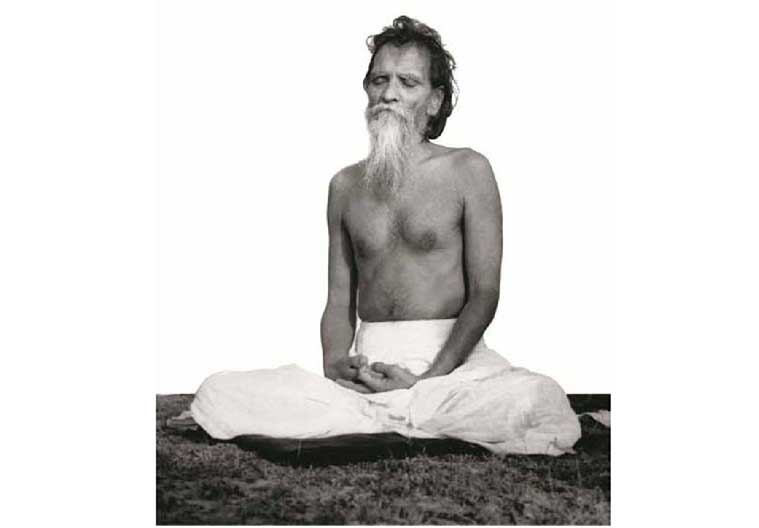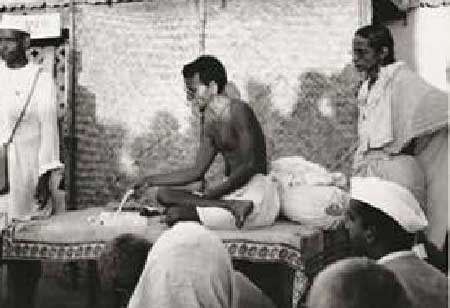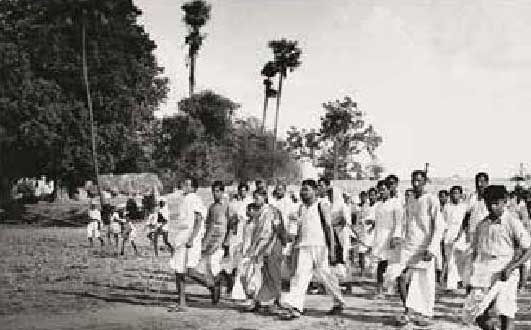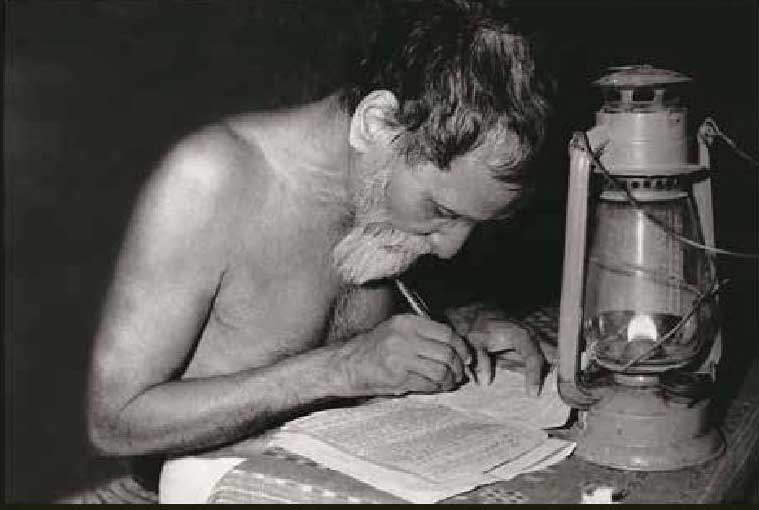Life

Vinayak Narhar Bhave, who later became known as Vinoba, was born on 11 September 1895 at Gagode, a tiny and predominantly tribal hamlet in the coastal Konkan region of Maharashtra. He spent eight formative years of his life amidst the picturesque beauty of the village. His next thirteen years as a student were spent at Baroda, where his father was employed.
As a child, Vinayak was deeply influenced by the rational and scientific approach of his father and deep devotion of his mother. It was his mother who impressed on him the need to care for others and share with others what one had.
As a student, he was a voracious reader, with an insatiable thirst for knowledge. He read almost all books in Baroda’s famous Central Library. But the routine grind of the school education was an anathema to him. Like reading, he had also a passion for roaming, which later stood him in good stead. Markedly disinterested in worldly affairs, he was eccentric and cared little for etiquette, yet had a circle of close friends with whom he formed a ‘Students’ Society’. His public life began in that Society which organised talks and discussions.
As a child, he resolved to observe brahmacharya throughout his life. Propelled by spiritual quest, he made up his mind to leave home at an early age. There was also a strong motivation to do something for the freedom of the country, which was then under British Rule. Ultimately, on 25 March 1916, he left home, discontinued formal education and went to Varanasi, which lay in between Himalayas, the traditional abode of spiritual seekers and Bengal, the land of heroic freedom fighters.
It was at Varanasi that Vinayak heard of Gandhi, the man who had led the unique struggle of Indians in South Africa. He wrote to him, posing some questions. Gandhi wrote back, asking him to come to Ahmedabad. Vinayak went to Ahmedabad and met Gandhi on 7 June 1916. There he found a man who had integrated spiritual quest and national service in his approach and programmes. He found in Gandhi an amalgam of the peace of the Himalayas and the revolutionary fervour of Bengal, and settled at Gandhi’s feet.

At Sabarmati Ashram, Vinayak carried out all the allotted tasks, besides continuing study of various subjects. Gandhi gave him the name ‘Vinoba’ on the lines of the great Maharashtra saints Jnanadev and Tukaram who are fondly referred to as ‘Jnanoba’ and ‘Tukoba’. Vinoba also taught students at the ashram and carried out intensive and pioneering experiments in various fields of constructive work like khadi, education and sanitation.
In 1921, he was sent to Wardha to run a branch of the Ashram. Struggle for Independence was going on in the country under Gandhiji’s leadership; Vinoba participated in it and had to suffer imprisonment for many years, although he shunned limelight and avoided political platform. In 1940, he was chosen by the master as the first satyagrahi in the Individual Disobedience campaign. To introduce Vinoba, little known outside the Ashram circle, to the world, Gandhiji wrote an article titled ‘Who is Vinoba?’
Vinoba’s literary genius came to the fore with his articles in the journal ‘Maharashtra-Dharma’ during 1923-27. In 1930-31, he translated Bhagvad-Gita in Marathi verse. The celebrated work soon became popular. More than 4 million copies of the work have since been printed. In 1932, in Dhulia jail, he delivered 18 talks on 18 chapters of the Bhagvad-Gita, which were published under the title ‘Gita Pravachane’. It has been translated in 23 languages: all the major Indian languages including Sanskrit and Bagadi, a language of tribals in Rajasthan, and in Nepali, Danish, German, Japanese and Korean. (Editions in all the 24 languages have been uploaded on this website.)
In Wardha Ashram, Vinoba collected a band of dedicated workers who worked tirelessly for different programmes of village-service. To organise village-service, Vinoba established Gram-seva Mandal in 1934. (Paramdham Prakashan, which has been a vehicle of Vinoba’s thoughts, is a wing of Gram-seva Mandal.) Till Gandhiji’s assasination, he was engaged in silent, but path-breaking constructive work in the Ashram.

After that, he became the natural leader of the Gandhian fraternity, which formed ‘Sarvodaya Samaj’, although he never joined any institution or organisation in any capacity.
When he was on a walking tour of Telangana, ravaged by Communist insurgency, he received a land-gift of 100 acres (40 hectares) for the landless dalit families at Pochampalli on 18 April 1951. Vinoba looked at the incident as an opportunity to try to solve an urgent and important problem through non-violence. During Telangana tour, 12,200 acres were received as Bhoodan (Land-gifts).
On 12 September 1951, Vinoba set out for a walking tour towards Delhi; and then did not look back. The padayatra (walking tour) continued for thirteen years, traversing around 65,000 km covering the entire country. Bhoodan spread throughout the country. For Vinoba, Bhoodan was not only for the solution of an economic problem, it was to be the harbinger of a total non-violent revolution in the lives of individuals as well as in the social structure, which would establish peace in the whole world.

Vinoba asked for land not as a charity, but as a right of the landless. He proclaimed that land, like air, water and sunlight, could not be private property of anyone. To claim ownership over land was a sin. Bhoodan, to him, was a yajna, wherein everyone was supposed to sacrifice something. He therefore asked for, and received, land from the poor small farmers also. Vinoba’s words, backed by irrefutable arguments and overflowing with compassion, could not be resisted. As he was basically seeking transformation in lives, and not just land, he would refuse to accept a gift if it came with riders or if he sensed any untoward motive.
About 4.8 million acres of land were received in Bhoodan. About 2.5 million acres have since been distributed to the poor deserving landless, mostly from S.C., S.T. and backward communities, giving them a permanent source of income, thereby improving their economic condition, enhancing their social status and contributing to their political empowerment. And this has been brought about entirely through moral suasion. Such an experiment, on such a wide scale, has no parallel in the annals of world history.
Gramdan, which blossomed out of Bhoodan, was a revolutionary idea and programme. It involved voluntary surrender of land-ownership to the village community. Thousands of villages came forward to embrace Gramdan. It was even more unbelievable than Bhoodan, and was a tribute to Vinoba’s spiritual charisma. Like Bhoodan, Gramdan Acts were made by various state governments. (They have been uploaded on this website.)
Vinoba not only gave land, he presented before the people, even those leaving in the remotest corners of the country, novel ideas and concepts having bearing on the transformation of life. Several of these path-breaking concepts are still relevant and capable of guiding humankind for years to come. He believed in the power of thought and held that change in thought alone would bring about lasting social change.
He therefore looked upon himself as basically a teacher. He was not only a teacher but also an educationist who conducted innovative experiments and presented striking insights.

Vinoba’s original works, besides ‘Gitai’ and ‘Gita Pravachane’, include ‘Sthitaprajna-Darshan’ (‘The Steadfast Wisdom’), ‘Gitai Chintanika’, ‘Jnanadevanchi Bhajane’, ‘Ishavasya-Vrutti’ ‘Vichar-Pothi’ and ‘Swarajya-Shastra’. He has also presented the essence of Christianity and that of Islam and rearranged ‘Dhammapad’ and selected verses from major Indian saints. An appreciation of the power of words and rare command over them have given his prolific writings a unique grandeur that cannot fail in captivating any reader.
A social scientist and a social activist, a political philosopher and a leader of the greatest political movement in Independent India, an educationist and a literary genius—Vinoba was all this and much more. And above all, he was a man of God and a sage who personified in him the spiritual traditions of mankind. Few have bequeathed as much as him to the humankind.
He spent his last days in his Ashram at Pavnar in Central India and breathed his last there on 15 November 1982.